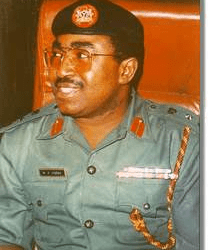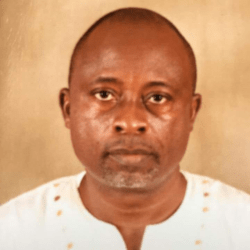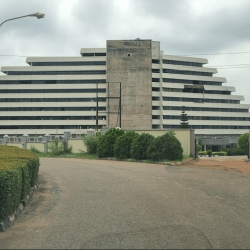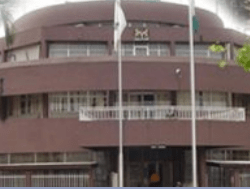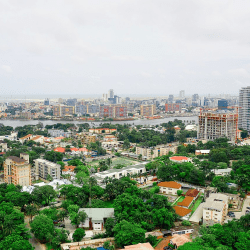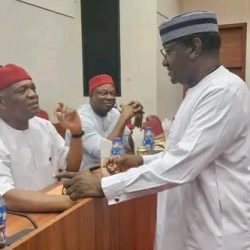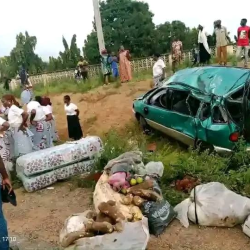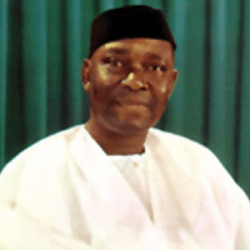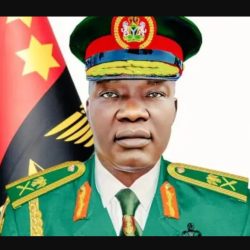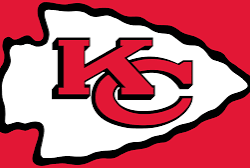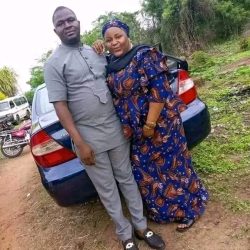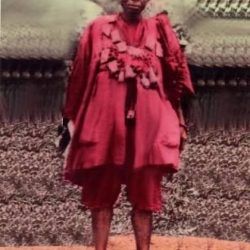Past Lagos State Governor Buba Marwa and his wife while in office.
Marwa was Military Governor of Lagos State for 3 years, from 1996 to 1999.

COLONEL MOHAMED BUBA MARWA
FSS, MSS, Psc,
FORMER MILITARY ADMINISTRATOR,
LAGOS STATE
Colonel Mohamed Buba Marwa was born on September, 9, 1953 in Kaduna where his father was serving as an officer in the Nigerian Army. The family is from Michika in Adamawa state.
He was educated at the Nigerian Military School Zaria and the Nigerian Military Academy Kaduna. He was commissioned as a Second Lieutenant in Nigerian Army Reconnaissance Corps and later the Armoured Corps. Col. Marwa has since being commissioned held a number of Command and Staff appointments. He is a holder of two Master’s degrees in International Affairs and Public Administration from the Universities of Pittsburgh and Harvard respectively.
Before his appointment as Military Administrator of Lagos State, Col. Marwa was one time Military Governor of Borno State (1990 – 1992), Deputy Defence Adviser Nigerian Embassy, Washington D.C. and Defence Adviser to the Nigerian Permanent Mission, United Nations Headquarters, New York.
Colonel Marwa was the eleventh Chief Executive of Lagos State.

Mrs. Munirat Marwa is the wife of the former Lagos State Administrator.
They have been married for several years and have 3 children, 2 girls and a boy.
Mrs. Marwa was the Chairperson of the State Chapter of the Family Support Programme (FSP) and the Family Economic Advancement Programme (FEAP).
The Family Economic Advancement Programme (FEAP)
Further to its family well-being agenda is the prosecution of the Family Economic Advancement Programme (FEAP). FEAP is an offshoot of the Family Support Programme. FEAP was initiated as a family economic empowerment programme designed specifically for stimulation of locally based potential entrepreneurs in the establishment of small scale and cottage industries.
The Family Support Programme
The Family Support Programme was a supportive programme designed to strengthen the Nigerian families in dealing with the realities and challenges of life.
The main objectives were to:
- Promote decent health care delivery, among the Nigerian families
- Assist in identifying economically viable enterprises
- Patronise and improve the occupational products
- Promote the socio-cultural gains of the people
- Attention is equally focussed on assisting the less privileged, particularly the disabled, widows, drop-outs, destitutes, orphans and the indigent. It provides family advise on such bad habits as child abuse, drug addiction, sexual promiscuity etc.
The State Family Support Programme, Chairperson, Mrs. Munirat Marwa, immediately on her assumption of office in August, 1996, stood firmly to address various problems plaguing families.
During the enlightenment campaign, she launched the Local Immunisation Days in the Local government areas as part of the National Programme on Immunisation (NPI). The crusade witnessed a phenomenal increase in immunisation coverage of the targeted children population. The child-survival programme also witnessed the intensification of the children de-worming exercise.
The FSP in recognition of the right of the child to good education, established a Nursery Section at the Secretariat Day Care Centre, Alausa, Ikeja on 5th September, 1996. Similarly, an FSP Nursery/Primary School was founded at 19, Oba Akinjobi Street, GRA Ikeja in the second quarter of 1997 and was commissioned by the State Military Administrator in August 1997.
The aim is to provide conducive learning environment for the orderly development of children and to assist working mothers to perform their official duties with less distraction.
For a meaningful impact, FSP carried out a comprehensive survey of agricultural and mineral resources that are available in all the Local Government Areas of the State. Equally, the State F.S.P. Chapter successfully held a workshop on FSP in collaboration with the State Ministry of Commerce, Industry and Tourism between 17th to 18th June, 1997.
Lagos
Lagos is the commercial capital of Nigeria and the most populated city in the country and Africa.

Lagos was the administrative capital of Nigeria until December 1991 following the government’s decision to move the capital to Abuja in the centre of the country.

Lagos is a major African financial centre and is an economic hub.

The city has been described as the cultural, financial, and entertainment capital of Africa, and is a significant influence on commerce, entertainment, technology, education, politics, tourism, art, and fashion.

Lagos is also among the top ten of the world’s fastest-growing cities and urban areas.

The megacity has the fourth-highest GDP in Africa and houses one of the largest and busiest seaports on the continent.
The Lagos metropolitan area is a major educational and cultural centre in Sub Saharan Africa.

Lagos emerged as a home to the Awori tribe of the Yoruba of West Africa islands, which are contained in the present day Local Government Areas (LGAs) of Lagos Island, Eti-Osa, Amuwo-Odofin and Apapa.

Due to rapid urbanisation, the city expanded to the west of the lagoon to include areas in the present day Lagos Mainland, Ajeromi-Ifelodun, and Surulere.
This led to the classification of Lagos into two main areas: the Island, which was the original city of Lagos, and the Mainland, which it has since expanded into.
This city area was governed directly by the Federal Government through the Lagos City Council, until the creation of Lagos State in 1967, which led to the splitting of Lagos city into the present-day seven Local Government Areas (LGAs), and an addition of other towns (which now make up 13 LGAs) from the then Western Region to form the state.

The islands are separated by creeks, fringing the southwest mouth of Lagos Lagoon, while being protected from the Atlantic Ocean by barrier islands and long sand spits such as Bar Beach, which stretch up to 100 km east and west.

However, the state capital was later moved to Ikeja in 1976, and the federal capital moved to Abuja in 1991.

Even though Lagos is still widely referred to as a city, the present-day Lagos, also known as “Lagos Metropolitan Area” is an urban agglomeration or conurbation, consisting of 16 LGAs including Ikeja, the state capital of Lagos State.

This conurbation makes up 37% of Lagos State total land area, but houses about 85% of the state’s total population.

The business district of Lagos is home to Tinubu Square, named after the aristocratic slave trader Efunroye Tinubu. Lagos contains Murtala Muhammed International Airport, named after Nigerian president Murtala Muhammad, and is one of the busiest African airports. Lagos National Stadium has hosted various international sports events such as the 1980 African Cup of Nations.
